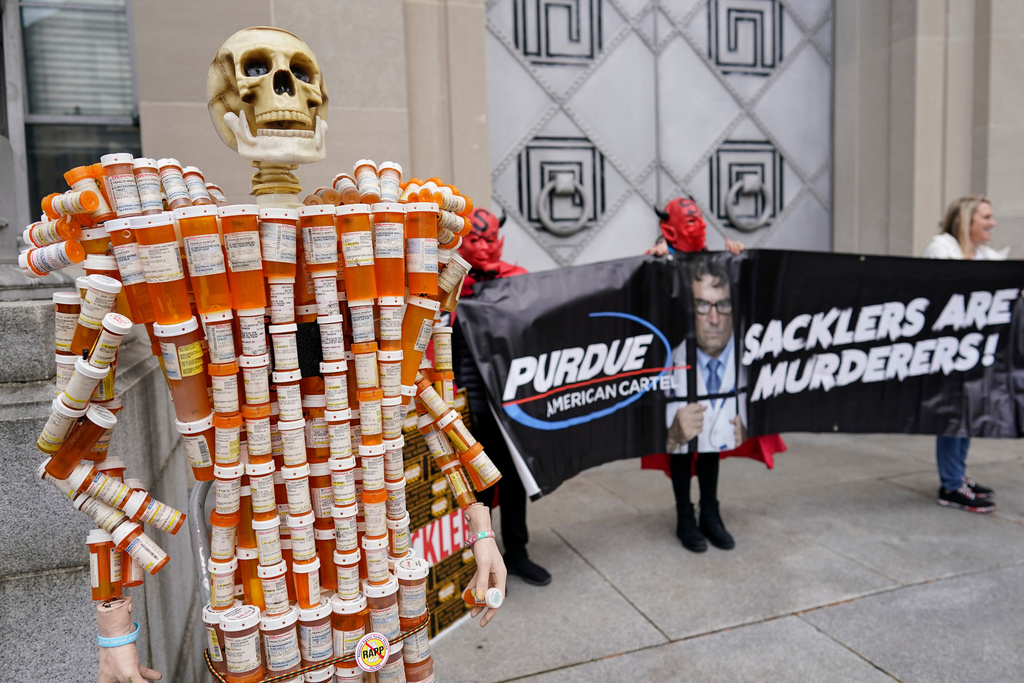By GEOFF MULVIHILL Associated Press
Members of the Sackler family who own OxyContin maker Purdue Pharma must pay billions of dollars to settle a flood of lawsuits over the harms of opioids, in a new deal formally approved by a federal bankruptcy judge on Tuesday.
The Sacklers must contribute up to $7 billion over 15 years. Most of the money will go to government entities to fight the opioid crisis, which has been linked to 900,000 deaths in the U.S. since 1999. Thousands of victims could be paid thousands of dollars each, with some distributions beginning next year for people who had OxyContin prescriptions and their survivors.
“This plan is not perfect,” U.S. Bankruptcy Judge Sean Lane said as he laid out his reasoning for approving the settlement, which he indicated he would do last week. “The court wishes it could do more to ease the suffering of the opioid crisis.” Still, he said the settlement is equitable, in the parties’ best interests, and overwhelmingly supported by groups with claims against Purdue.
The agreement replaces one the U.S. Supreme Court rejected last year, saying the earlier proposal would have improperly shielded Sackler family members from future lawsuits. The new agreement allows entities that do not opt into the payments to still sue members of the family.
The deal is among the largest in a series of opioid settlements brought by state and local governments against drugmakers, wholesalers and pharmacies that totaled about $50 billion.
Why the judge said he approved the deal
Lane said the plan offers more certainty and value than years of litigation would. Suing the Sackler family members would have no guarantee of success, he said, and it could be hard to collect because much of their wealth is held in off-shore trusts. The family has consistently said they would fight claims against them.
He also noted that states and individuals would get less if Purdue were liquidated, as only only $3.4 billion would have been available, including $2 billion owed to the federal government as part of the company’s criminal plea deal. The federal penalties were to be largely waived if a broader settlement could be reached.
Money will go to governments and some individuals
Sackler family members were collectively paid more than $10 billion by Purdue in the decade before they stopped involvement with the company in 2018. About half of that went to taxes. Under the deal, they will provide most of the settlement’s $7 billion. As in other opioid settlements, money distributed to states, local governments and Native American tribes must be used primarily on the opioid crisis. About $850 million will be set aside for individual victims, including children born with opioid withdrawal.
People with addiction and survivors of those who died must have proof they were prescribed OxyContin to participate. However, it could be a challenge for some to find medical records or photos of prescription bottle labels dating back decades.
Those who can provide documentation could receive $8,000 or around $16,000, depending on how long they received the drug and how many other people qualify. The money for individual victims is to be distributed next year.
Not only money is at stake
The Sackler family will also relinquish ownership of Purdue, although that won’t be a major challenge since no family member has served on its board or received money from the company since 2018. Purdue will be replaced with a new company, Knoa Pharma, controlled by a board appointed by the states and designed to operate in the public interest.
The Sacklers are also agreeing not to seek naming rights at institutions in exchange for donations, a common practice by the family before many organizations cut ties with them.
The company will publicly release a trove of internal documents that could shed more light on how the company promoted and monitored opioids.
One part of an earlier settlement will not return: a requirement for Sackler family to hear directly from people harmed by OxyContin.
A long legal saga could be wrapping up
Purdue filed for bankruptcy in 2019 as it faced thousands of opioid-related lawsuits. A judge approved a settlement two years later, but the Supreme Court struck it down because it protected the Sacklers from lawsuits over opioids even though they were not personally declaring bankruptcy. The new plan avoids that issue by allowing those who don’t opt into the deal to still sue the family.
Few parties objected to the settlement this time, although opioid victims who represented themselves raised concerns during last week’s hearing. One of them told the judge on Tuesday she planned to appeal.
Mixed emotions from two moms affected by the crisis
Kay Scarpone of New Hampshire, whose son died of an overdose, served for years on a committee of creditors in Purdue’s bankruptcy. She’s glad the deal was accepted but saddened to say goodbye to the far-flung friends she worked alongside.
She said she participated to help “take what you can get from the Sackler family and do the best thing you can do, which is get money into the hands of the victims.” Still, Scarpone expects many will be upset once they see the actual payout sizes.
For Susan Ousterman, a Pennsylvania mother whose son also died of an overdose, the ruling is only disheartening. It’s another reminder, she said, of “how complicit the system is.”
“These people will walk free. They’re criminals,” she said Tuesday of the Sacklers. “They scare me far more than any drug dealer.”
News
Here’s what’s in the opioid settlement against OxyContin maker Purdue and the Sackler family

FILE - "Pill Man" made by Frank Huntley of Worcester, Mass., from his opioid prescription pill bottles, is displayed during a protest by advocates for opioid victims outside the Department of Justice, Dec. 3, 2021, in Washington. (AP Photo/Carolyn Kaster, File) Photo: Associated Press





